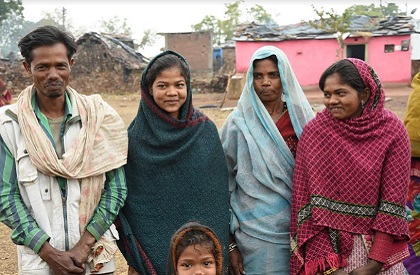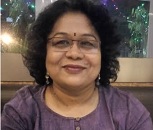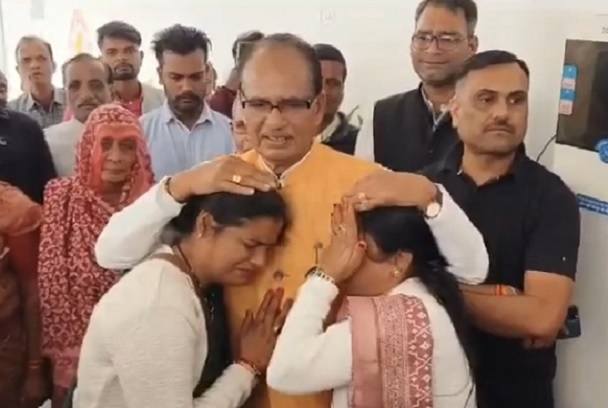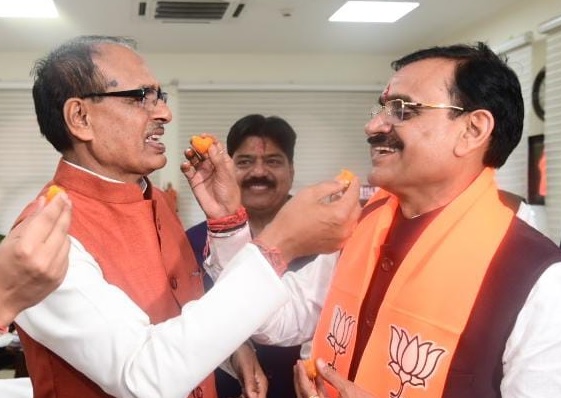In MP, 110 primitive tribal villages say no to child marriage, stick to resolve for a year

Sravani Sarkar
NewsBits.in
SHIVPURI: Sapna Saharia is a typically shy girl from Jakhnod village in Shivpuri district. Yet she is not as shy as her sister and friends and opens up after some pep talk. And what she tells you is pleasantly surprising and hugely encouraging.
Sapna’s parents have decided not to marry her or her sister off before they turn 18 and have studied up to a suitable level. “They told me last year that they would like me to continue my studies and not plan my marriage anytime soon,” she says, while her parents nod in agreement.
And Sapna’s is not a one-off example in Pohari. A wave of change is sweeping 110 Saharia-tribe dominated villages in the block that have decided to shun child marriages, stuck to the resolve for a year and this augurs well for future.
The story started a year ago, on January 18, 2018, when primitive Saharia tribal residents from 15 villages in Pohari took some important vows. They resolved to give up liquor and tobacco products, but more importantly they decided not to get their children married before they attained the legal age.
It was a big resolve for a society that is considered still strongly bound by traditions – good or bad. But a year on, the movement has only spread and residents of all 110 Saharia-dominated villages proudly claim that they have stuck to their vow on ending child marriages, even though some might have faltered on the resolve regarding de-addiction.
A discussion with young girls and adults from some of these villages does confirm the claim. Sapna’s parents Raghubir and Bhagwati are among them. “We would like all our children to become self-dependent before they are married,” Bhagwati said.
Sapna, the least shy among the village girls Rajni, Lalita, Rita and Usha, continues that they as young girls know that getting married early could ruin their health and that of coming babies. Also the economic burden on young couple becomes greater if early marriages happen, she says.
Ramdulari Adiwasi, from Machakhurd village, agrees that one of the reasons for high maternal and child mortality in the area was because of early marriages and says that this resolve would continue.
Atar Singh, from village Mehra says that before marriage it is important that the young people attain the ability to run their families and also are physically and mentally in a shape to become healthy and good parents. Sushila Adiwasi from Jakhnod also agrees to the point.
Ajay Yadav, a local social activist who works on a community-based malnutrition management programme in Pohari block, says that it is pleasantly surprising to see the primitive tribe people keeping up such a strong resolve on an important issue.
“We had just given an outside input on the issue to Ramkishore Saharia of Parasari village and some others who was promoting giving up of bad habits and traditions and they wonderfully adopted it,” he says. Shivpuri district collector Anugraha P says that it is a healthy and appreciable initiative and the district administration would do its best to get it reciprocated elsewhere.
“Community led initiatives on advancing the rights of children particularly pursuit to end child marriages can significantly yield dividends when their resolve and commitments spur sustained social behavior which translates into concrete actions- no engagement in child marriages-as evident in Saharia-villages of Shivpuri district.
Child marriage is a violation of child rights, and this positive step by Saharia villages is a trigger worth replicated across the villages in the state,” Michael Juma, Chief, UNICEF, Madhya Pradesh said. Like Sapna Saharia says – we want to grow up to be good citizens and fulfill all our responsibilities. The future does seem to be bright at least for this so called backward block in MP.











